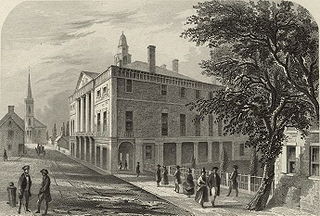
The 1st United States Congress, comprising the United States Senate and the United States House of Representatives, met from March 4, 1789, to March 4, 1791, during the first two years of George Washington's presidency, first at Federal Hall in New York City and later at Congress Hall in Philadelphia. With the initial meeting of the First Congress, the United States federal government officially began operations under the new frame of government established by the 1787 Constitution. The apportionment of seats in the House of Representatives was based on the provisions of Article I, Section 2, Clause 3 of the Constitution. Both chambers had a Pro-Administration majority. Twelve articles of amendment to the Constitution were passed by this Congress and sent to the states for ratification; the ten ratified as additions to the Constitution on December 15, 1791, are collectively known as the Bill of Rights, with an additional amendment ratified more than two centuries later to become the Twenty-seventh Amendment to the United States Constitution.
The United States Senate elections of 1790 and 1791 were the second series of elections of senators in the United States. In these elections, terms were up for the nine senators in Class 1. As of these elections, formal organized political parties had yet to form in the United States, but two political factions were present: The coalition of senators who supported President George Washington's administration were known as the Pro-Administration Party, and the senators against him as the Anti-Administration Party.